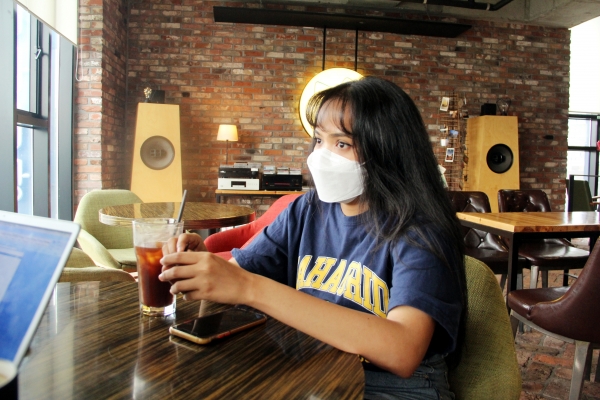
Studying a foreign language, as well as its literature, in your mother tongue takes dedication. It would undoubtedly be more difficult when studying it abroad in a foreign language. Before coming to Korea to study, Tiara Maya Azizah studied Korean and Korean literature at her university in Indonesia. She has been studying in the Department of Korean Language and Literature at Ewha for more than four years. Ewha Voice recently caught up with Tiara to find out her story in Korea.
Considering her interest in Korean, Tiara had majored in Korean Language for two years at Universitas Gajah Mada in Indonesia. After her professor in Indonesia recommended her to continue her academic life in Korea, she figured that Ewha would be her first choice, based on her interest in women’s studies. Another factor that played into this decision was that she had never experienced a women’s university, as all Indonesian academic institutes are coeducational.
Tiara lives alone in her apartment near student-friendly Hapjeong Station, where she is busy delving into preparation for her research paper on Korean literature. “Kim Ji- Young, Born 1982” is Tiara’s favorite. She had initially read the Indonesian translation, but as with most translated literature, there are vital meanings lost in translation. After reading the Korean version and further understanding its implications, it shifted Tiara’s life and acted as a turning point.
“If you are from the West, the narrative could be unfamiliar, but if you are from the East, you are able to relate to the story,” Tiara said. “Indonesia is also patriarchal, but it seems less so than Korea. There is also a preference for boys and even now, many Indonesians still think that women do not need to go to college.”
Tiara believes that a charming aspect of Korean literature is the visceral reality present in the writing. As a reader, it transports her into the story by conveying a closeness to the story and the characters and herself. Compared to Indonesian and Western stories, Tiara was naturally drawn to the greater realism based in Korean literature.
“My favorite genre of all time is romance. Korean novels, especially classics, are less cringy even though they include romantic elements,” Tiara said. “Rather than fantasizing love and fanboying over the main characters, Korean romance novels portray genuine human feelings in a dry tone. That’s why I prefer Korean romance novels.”
With the unique realities portrayed in Korean literature, concepts like han and jung make their meaning more special. These terms, even for Tiara, took time to comprehend fully, as such concepts do not exist in Indonesia.
“When I was in Indonesia, professors explained jung as warmth and han as the sorrow of Koreans,” Tiara said. “I wanted to understand them better, so I studied research papers and asked my professor to recommend a novel that portrays han. But the professors at Ewha did not directly mention either concept, so I tried to classify han and jung through class lectures.”
As Tiara discovered over time, the differing concepts were not the only differential aspects between Indonesian and Korean literature. For example, one of the biggest differences for Tiara was the significant clout that Korean literature was swayed by its independence movement during the Japanese occupation. Whereas in Indonesia, such influences never took hold in its literature. There was little connection between social movements in Indonesia and its literature.
However, there were still some commonalities between the two Asian nations’ literature. According to Tiara, there is a tendency for both countries’ literature to fall on male-centered perspectives, as only a few female writers could be found in the past.
For Tiara, though, this journey would not have been possible without coming to Ewha and Korea. Both the journey and what she is studying exuded warmness.
“If someone asked me to describe Ewha in one word, it would be coziness,” said Tiara. “When I went to a coeducational university in Indonesia, I used to be self-conscious even though I tried not to be. At Ewha, I am free from caring about what others think. Even though I am away from friends and family, I feel comfortable here.”

